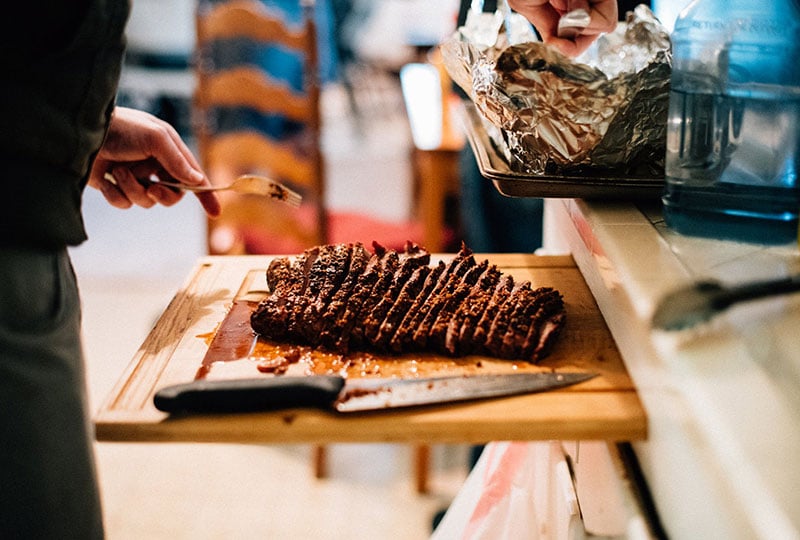The customer service team is always listening, taking notes, and quantifying complaints to ensure our products are continually improved. Due to selling directly to you, the customer, via Amazon, we can use product reviews to help us improve our existing products or help further development of new products.
Newbie Tips for Making Roast Duck on Your BBQ
Table of Contents
BBQ pork, beef, and chicken are all mainstays of the backyard grill and smoker, and it’s high time to add another key BBQ dish: roast duck. This overdue staple provides all of the amazing flavor and texture that other BBQ favorites provide, and it’s downright criminal that more home chefs aren’t taking the opportunity to experience this amazing food for themselves.
If you’re a BBQ fan who has never tried roast duck before, it is definitely something you should experience for yourself. Its meat is very flavorful and juicy. Even better, its skin is an absolute culinary delight to enjoy, whether in its crispy form or not.
Never made roast duck by yourself before? You’re in luck. Check out this handy list of helpful tips to learn how you can make this delectable BBQ dish on your own backyard grill or smoker. With luck, you’ll be able to get up to speed in no time on this amazing delicacy.
You Can Eat Roast Duck Medium-Rare
At first glance, you’d think that making roast duck would be a lot like making roast chicken, but nothing could be further from the truth. Instead, this type of ingredient shares more similarities with red meat.
Not only does duck look similar to red meat along with a similar texture, but it is safe to eat at a medium-rare level of doneness. As birds of flight that require a high level of oxygen in their blood, duck meat is saturated with myoglobin, the red liquid we’re most familiar with as the “juice” that spills out of a rare steak.
As such, duck meat does not have the same risk of Salmonella as does chicken meat, and can be consumed medium-rare. In fact, medium-rare is the preferred way to prepare roast duck in French cuisine.
Go Low & Slow
This tip will sound familiar to anyone who has made pulled pork and is especially useful here. When making roast duck, also adopt a cooking strategy of lowered cooking temperatures for longer cooking durations. Duck meat has high fat content, meaning that higher temperatures will burn it.
To accommodate this, don’t cook the duck directly over the heat source. Instead, set up two heat zones on your grill by limiting your fuel source to a single area. Then, place the duck on the other side of the fire. By having direct and indirect heat, you will be able to roast the duck without burning it.
As a bonus tip, be sure to put a pan underneath the duck to collect drips. As the duck cooks, it will drip fat over the coals/fuel source and cause flare-ups. To prevent this, put a pan in the empty space where there are no coals.
The extra care required to make roast duck may be time-consuming, but it’s all part of the waiting game that making great BBQ required. Be patient, and enjoy the process!

With Roast Duck, Beauty is Skin Deep
If you think the best part about roast chicken is the skin, you are absolutely going to love roast duck. As succulent and juicy as its meat can be, roasted duck skin is absolutely divine. What’s more, roasted duck skin can take on different tastes and textures depending on its cooking temperature. This means roast duck skin can even become crispy, making for a truly extraordinary BBQ experience.
When preparing duck meat for roasting, an important step is to pierce its skin. This will allow its fat to properly drip out during the cooking process. Having too much of this subcutaneous fat may cause problems because it will not melt properly. Only the skin of the duck needs to be pierced, and not its flesh. This may sound troublesome, but raw duck skin is notoriously saggy, making it easy to grip and puncture.
Bonus Tip: if you want crispier skin, choose a leaner duck at the market. To that end, another way to reduce duck fat is to boil it in salted water for about 5 minutes.
Roast Duck Meat is Healthy
All this talk of duck fat makes it seem like it is unhealthy when it actually provides a number of health benefits.
Duck is very high in iron. It provides more iron per serving than chicken, turkey, and even some cuts of beef. Additionally, duck contains essential nutrients such as vitamin E, niacin, and selenium.
And while it may be oilier than other foods, duck fat has the benefit of being higher in monounsaturated fats. This helps lower LDL cholesterol, making it more similar to olive oil than other animal fats.
It’s Not That Difficult to Make
You may have first heard about roast duck from French cuisine and, by extension, come to understand that making roast duck is a complicated and difficult procedure. And yet, outside of French cuisine, making roast duck is downright easy to do.
For one thing, it is nearly impossible to overcook roast duck. This is due to a thick layer of fat inherent to all ducks. This layer of fat gives duck its unique flavor and a built-in safety device for novice cooks. In fact, for certain cuisines as in Chinese food, roast ducks are cooked to a high level of doneness to produce the delicacy of crispy duck skin.
On the other hand, because its long cooking requirements may lead to undercooking, beginner cooks can also find themselves in the clear so long as their meat has reached a medium-rare level of doneness.
Final Thoughts
If nothing else, the key takeaway of all this is: Don’t be intimated. If you’ve always been curious about making roast duck, take the plunge! It’s a great alternative to making BBQ pork and chicken; take the opportunity to try out something new on your grill!








